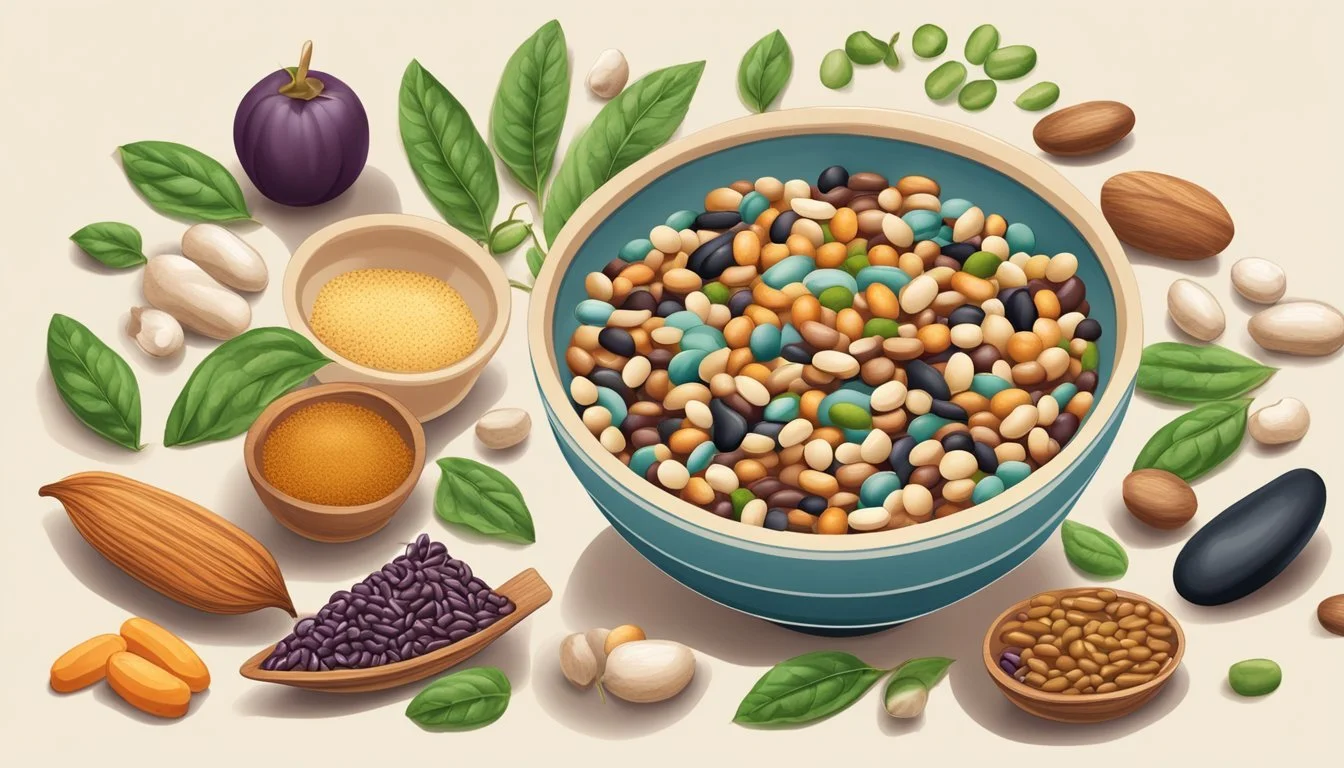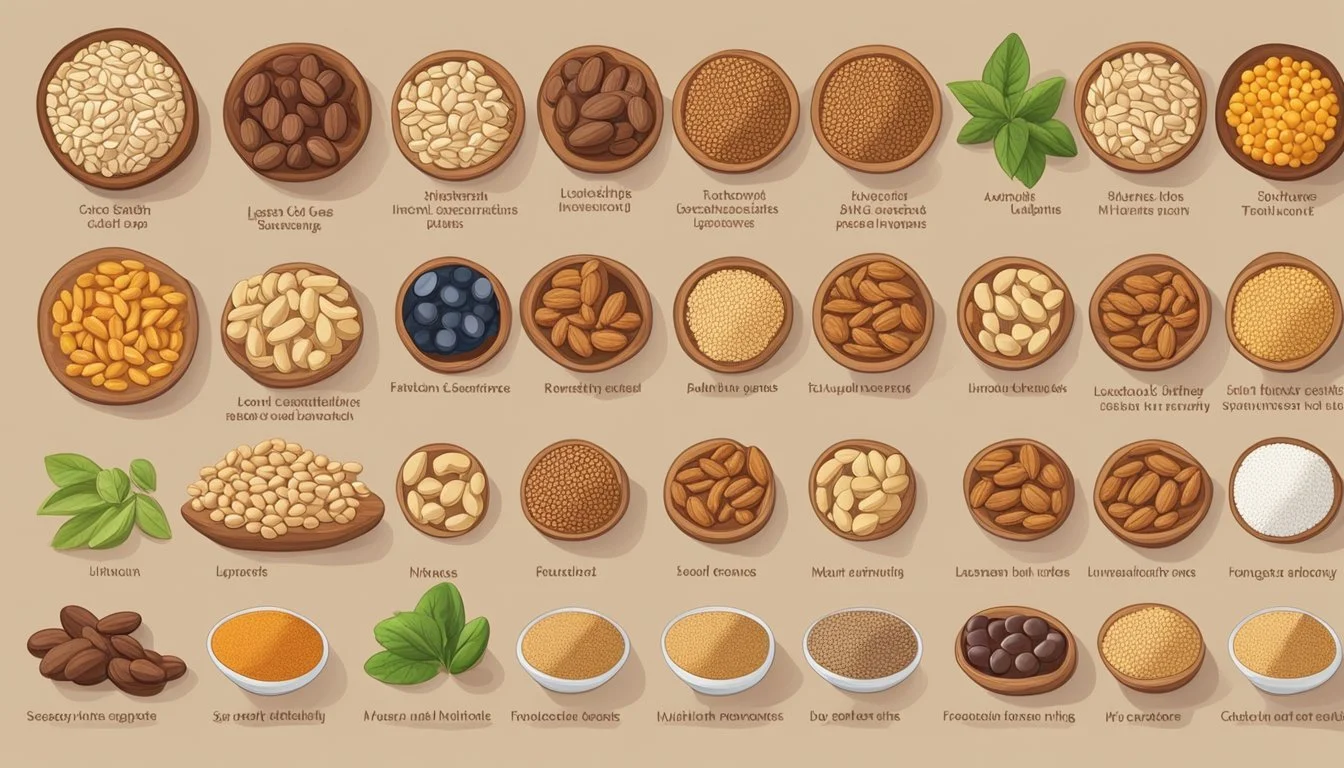Top Inositol-Rich Foods
Top Sources and Health Benefits
Inositol, a type of sugar alcohol often referred to as vitamin B8, plays a crucial role in various bodily functions, including cellular communication and insulin signal transduction. Consuming foods high in inositol can contribute to better brain health, improved mood, and enhanced metabolic processes.
This article aims to explore various foods rich in inositol and discuss how they can be integrated into daily diets to harness these health benefits. By doing so, readers can make informed dietary choices that promote overall well-being.
1) Cantaloupe
Cantaloupe is a standout fruit when it comes to inositol content. This juicy melon provides about 355 mg of inositol per serving, making it one of the richest sources available.
Rich in vitamins A and C, cantaloupe supports overall health while delivering a substantial dose of this important compound.
Including cantaloupe in the diet is easy. It can be enjoyed fresh, added to fruit salads, or blended into smoothies. Its sweet, refreshing flavor complements both savory and sweet dishes, making it versatile.
Beyond inositol, cantaloupe also contains fiber, which aids digestion. This combination of nutrients makes it a valuable addition to a balanced diet. For those looking to boost their inositol intake, cantaloupe is an excellent option.
2) Oranges
Oranges are a prominent source of inositol, particularly myo-inositol. This nutrient plays a crucial role in various cellular processes, including insulin signal transduction and lipid synthesis.
Rich in vitamins and minerals, oranges provide a significant boost to overall health. Consuming citrus fruits like oranges can help maintain an adequate level of inositol in the diet.
In addition to inositol, oranges are packed with vitamin C, fiber, and antioxidants. These components support immune function, digestive health, and cellular repair.
The inclusion of oranges in a balanced diet can promote better brain health and metabolic function. Regular consumption of oranges is a simple and effective way to harness the benefits of inositol.
3) Brown Rice
Brown rice is a wholesome and nutritious grain packed with various nutrients, including inositol. This essential compound plays a significant role in several biological processes, including cellular growth and function.
In addition to inositol, brown rice offers a good source of fiber, aiding in digestion and promoting a feeling of fullness. A serving of brown rice can supplement dietary needs with B vitamins, magnesium, and selenium.
For those managing glucose levels, brown rice's complex carbohydrates can be beneficial. Its slower digestion rate helps in maintaining steady blood sugar levels. Including brown rice in meals is straightforward, whether it is a side dish or the base of a hearty bowl.
4) Brussels Sprouts
Brussels sprouts are a highly nutritious vegetable with notable inositol content. Inositol, a type of sugar, plays a role in cell membrane formation and is involved in various biological processes.
These small, leafy greens also boast a range of other nutrients. They are rich in vitamins C and K, fiber, and antioxidants such as beta-carotene.
Due to their nutrient density, incorporating Brussels sprouts into one's diet can support brain health and overall well-being. Their inositol content can contribute positively to this goal.
5) Cabbage
Cabbage is a vegetable rich in inositol, a vitamin-like substance that's beneficial for brain health. This cruciferous vegetable is versatile and can be easily included in various dishes.
Green cabbage, red cabbage, and savoy cabbage all contain notable amounts of inositol. Including cabbage in your diet can contribute to adequate inositol intake alongside other nutrients.
Fresh cabbage can be shredded for salads, stir-fried, or used in soups. Fermented cabbage, such as sauerkraut and kimchi, also retains inositol.
In addition to inositol, cabbage is high in fiber, vitamin C, and several other vital nutrients. This makes it a nutritious choice for various dietary needs.
6) Carrots
Carrots are a good source of inositol, a compound important for brain health and cellular function. Including carrots in your diet can help maintain an adequate intake of inositol while providing other essential nutrients like vitamin A and fiber.
Carrots can be consumed raw, cooked, or steamed. Steaming is particularly beneficial for preserving their inositol content, as high temperatures can degrade this compound. This makes them a versatile addition to various dishes and meal plans.
Adding carrots to salads, soups, or as a side dish can enhance both flavor and nutritional value. Carrot sticks also make a convenient and healthy snack option. Their mild taste makes them easy to incorporate into everyday meals.
7) Legumes
Legumes such as lentils, chickpeas, and beans are excellent sources of inositol. These foods are widely recognized not only for their inositol content but also for their nutritional benefits, including high levels of vitamins, minerals, and fiber.
Great Northern beans, for example, contain around 440 mg of inositol per serving, making them a potent source. Fresh green beans also offer a good amount, with about 193 mg per serving.
In addition to Great Northern and green beans, other legumes rich in inositol include lima beans, kidney beans, peas, and soybeans. These legumes can easily be incorporated into various dishes, from soups and stews to salads and sides.
Dietary inclusion of legumes can support brain health due to their inositol content. They also contribute to heart health and digestive health with their fiber and nutrient density. Incorporate these versatile legumes into meals to boost inositol intake naturally.
8) Whole Grain Bread
Whole grain bread is a prominent source of inositol. It provides a significant amount of this nutrient, making it a valuable addition to a balanced diet.
One slice of whole grain bread can contain substantial myo-inositol content. This not only supports brain health but also contributes to overall well-being.
Whole grain bread is also packed with dietary fiber, which aids digestion. It can be easily incorporated into daily meals, offering convenience alongside its health benefits.
Including whole grain bread in one's diet can be as simple as having a sandwich or toast. Its versatility makes it a practical choice for those looking to boost their inositol intake.
9) Beans
Beans are an excellent source of inositol. This nutrient plays a critical role in cell membrane health and signaling. Common types of beans include pinto, kidney, and great northern beans.
Great northern beans contain particularly high levels of inositol, making them an effective addition to a diet aimed at increasing inositol intake.
Green peas, another member of the legume family, are also rich in inositol. They offer a nutritious option for meals and snacks. Beans, in general, are also packed with other essential nutrients, such as protein and fiber, contributing to overall health.
In addition to their inositol content, beans are very versatile and can be incorporated into a variety of dishes, such as soups, stews, and salads. This makes them a convenient dietary choice for maintaining and improving brain health.
10) Grapefruit
Grapefruit is a citrus fruit known for its high inositol content. Inositol is a type of sugar related to the B-vitamins, playing a role in cellular signaling and fat metabolism.
Rich in vitamins and antioxidants, grapefruit provides an array of health benefits. Incorporating it into the diet can support brain health due to its inositol levels.
Grapefruit contains around 199 mg of inositol per serving. This makes it one of the top choices for those looking to increase their intake of this nutrient.
The fruit's refreshing taste and high water content make it a versatile option. It can be enjoyed on its own, in salads, or as a part of a balanced breakfast. Its combination of flavor and health benefits makes grapefruit a valuable addition to any diet.
Understanding Inositol
Inositol is a naturally occurring compound found in various foods such as fruits, beans, nuts, and grains. It plays an essential role in cellular signaling and mental health.
What Is Inositol?
Inositol is a carbohydrate with a chemical structure similar to glucose. It occurs naturally in many foods and is sometimes referred to as vitamin B8, though it's not a true vitamin. This compound is essential for cell membrane formation and affects processes such as insulin signaling and nerve function.
There are nine forms of inositol, and the most commonly found ones in the diet are myo-inositol and D-chiro-inositol. Foods like citrus fruits, cantaloupe, beans, and whole grains are rich sources of inositol. These foods can significantly contribute to dietary intake, benefiting various bodily functions.
Inositol's Role in the Body
Inositol is critical for several bodily functions, particularly how cells communicate and how the body processes insulin. It's involved in forming phospholipids, which are key components of cell membranes. This supports cellular health by maintaining structural integrity and facilitating communication.
In the brain, inositol influences neurotransmitter activity, including serotonin, which impacts mood and cognitive function. It is also being studied for its potential in managing conditions like anxiety, depression, and polycystic ovary syndrome (PCOS). Studies have indicated that inositol supplementation may help improve insulin sensitivity and hormone regulation.
A diet that includes inositol-rich foods can support overall health and potentially provide therapeutic benefits.
Types Of Inositol
Inositol exists in different forms, each playing unique roles in the body. Among these, Myo-Inositol and D-Chiro Inositol are the most researched and widely recognized for their health benefits.
Myo-Inositol
Myo-Inositol is the most prevalent form of inositol found in nature. It is essential for various biochemical processes, including cell membrane formation and insulin signal transduction. This type is abundant in many foods such as fruits, nuts, grains, and beans. Myo-Inositol supports mental health by impacting serotonin activity, which can help manage conditions like depression and anxiety.
Additionally, Myo-Inositol is known for its role in reproductive health. It is often used in supplements aimed at improving ovarian function and regulating menstrual cycles, especially in women with polycystic ovary syndrome (PCOS). Research has indicated that Myo-Inositol supplementation may also improve fertility outcomes.
D-Chiro Inositol
D-Chiro Inositol, though less common than Myo-Inositol, is another crucial form of inositol. It is particularly significant in the regulation of glucose metabolism and insulin sensitivity. Foods rich in D-Chiro Inositol include legumes, particularly chickpeas and lentils. This form has been studied for its potential benefits in managing conditions like type 2 diabetes.
D-Chiro Inositol converts from Myo-Inositol in the body on a need basis, ensuring a balanced distribution of both forms. Its role in improving insulin response makes it a notable aid for metabolic health. Furthermore, like its counterpart, D-Chiro Inositol is also used in reproductive health, particularly in addressing symptoms related to PCOS. This tandem functionality makes it a valuable component in targeted health regimens.
Health Benefits Of Inositol
Inositol offers numerous health benefits, particularly in areas of mental well-being and metabolic health. This makes it a valuable nutrient for overall health and wellness.
Mental Health Benefits
Inositol can play a significant role in improving mental health. Studies have shown it to be effective in alleviating symptoms of anxiety disorders and depression.
Anxiety Relief: Inositol helps to balance chemicals in the brain such as serotonin and dopamine, which are crucial for mood regulation. This can result in reduced anxiety levels.
Depression Management: People with depression often have lower levels of inositol in their brains. Supplementing with inositol has been associated with mood improvement and better emotional wellness.
Panic Disorders: Inositol has also been found to help individuals experiencing panic disorders by reducing the frequency and severity of panic attacks.
Metabolic Health Benefits
Inositol also contributes to metabolic health, providing potential improvements in conditions such as metabolic syndrome and diabetes.
Metabolic Syndrome: This syndrome includes risk factors like high blood pressure, high blood sugar, and abnormal cholesterol levels. Inositol helps in regulating these factors, thereby mitigating the condition's impact.
Diabetes Management: Inositol is beneficial for improving insulin sensitivity, making it easier for the body to manage blood sugar levels. This can be especially helpful for those with type 2 diabetes.
Weight Management: Some studies suggest that inositol can assist in weight loss by regulating metabolic processes and energy expenditure, aiding in maintaining a healthy weight.












